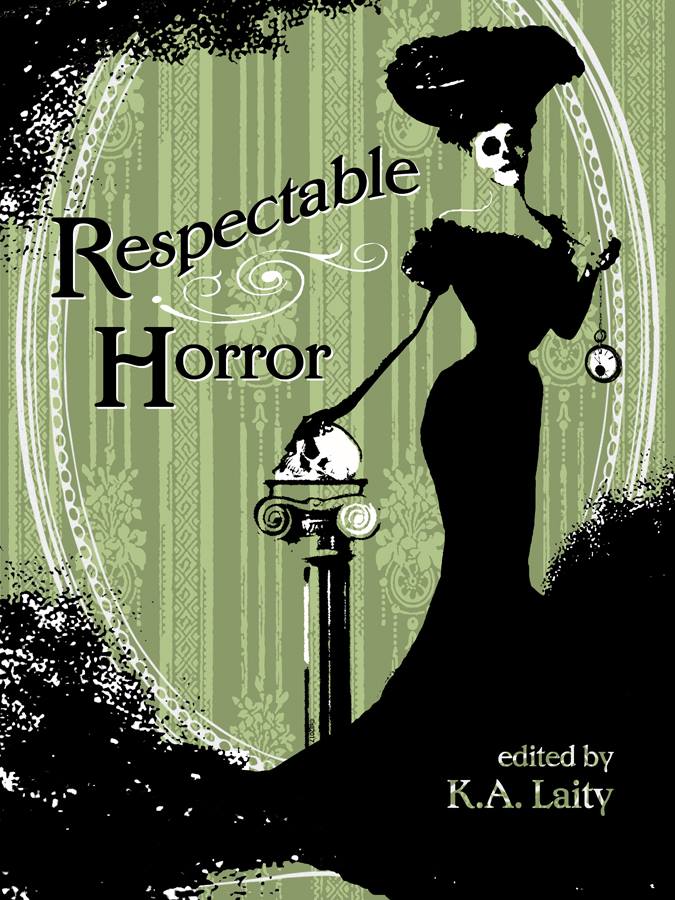‘A MONSTRUOUS LOVE’: CRIMSON PEAK AND THE WRITER
By C.A. Yates
Guillermo del Toro’s Crimson Peak gets a rough deal. Routinely (and boringly) dismissed as not being “horror” enough because it’s not chock-a-block with scares and icksome carnage and because it has the temerity to feature what appears to be a bosom-heaving love story, it seems to have been largely overlooked. Del Toro’s work is always beautiful to watch and Crimson Peak is no exception, but I have a soft spot for it because it takes the usual outcome of such stories and, well, smacks it on the backside.
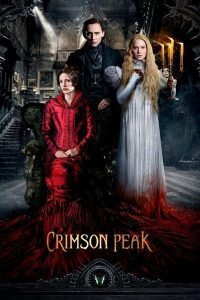 Most gothic romances are not the love stories the Cyril Sneers of this world so enjoy denigrating. Almost none of them end with a clichéd guy-saves-the-day-and-gets-the-girl denouement. Take Maud Ruthyn from Le Fanu’s Uncle Silas, a heavy influence on Crimson Peak. She is married at the end of the novel but no one comes to save her at the end of her story. She escapes her wicked uncle and his machinations by herself. Gothic romances are, in essence, about the journey to adulthood. Heroines are almost invariably very young women, of marriageable age but only just, thrown into circumstances beyond their control that test them to the extreme. After her ordeal, the gothic heroine more often than not gives up her childish dreams of adventure and accepts her prescribed role in society, usually as a wife and mother. The genre is not admiring the strength these women show so much as it is punishing them for their desires and admonishing them into accepting their proper place. These are cautionary tales. Edith Cushing, our heroine in Crimson Peak, however, rips up the rulebook and eats it for breakfast. Hers is not simply a journey of self-discovery that’s going to put her back at hearth and home; Edith sets out to make sure she is who she thinks she is or, perhaps moreover, become what she wants to become. What is that?
Most gothic romances are not the love stories the Cyril Sneers of this world so enjoy denigrating. Almost none of them end with a clichéd guy-saves-the-day-and-gets-the-girl denouement. Take Maud Ruthyn from Le Fanu’s Uncle Silas, a heavy influence on Crimson Peak. She is married at the end of the novel but no one comes to save her at the end of her story. She escapes her wicked uncle and his machinations by herself. Gothic romances are, in essence, about the journey to adulthood. Heroines are almost invariably very young women, of marriageable age but only just, thrown into circumstances beyond their control that test them to the extreme. After her ordeal, the gothic heroine more often than not gives up her childish dreams of adventure and accepts her prescribed role in society, usually as a wife and mother. The genre is not admiring the strength these women show so much as it is punishing them for their desires and admonishing them into accepting their proper place. These are cautionary tales. Edith Cushing, our heroine in Crimson Peak, however, rips up the rulebook and eats it for breakfast. Hers is not simply a journey of self-discovery that’s going to put her back at hearth and home; Edith sets out to make sure she is who she thinks she is or, perhaps moreover, become what she wants to become. What is that?
A writer.
Edith Cushing is an iconoclast, determined to set her own course, to write her own narrative. Of course she is limited by the time and circumstances she is living in but when she is given the opportunity to step outside of that, she embraces it. Right from the first frame, Edith is literally telling her story. Everything is a flashback because we start at the end of the story. She crowds the camera with her close up, face slashed and bleeding, but that half smile… man, has she got what she wanted or what? Against all the generic odds, Edith has created her narrative largely under her own agency. Of course there are times when others are directing proceedings and she is uncertain, afraid even. This is still a tale of self-discovery, of self-affirmation. There are lessons to be learned, a story to be written, and the movie is peppered moments of significance that have a direct connection to writing – the act of writing and the creation of story itself, illustrating and strengthening Edith’s goal while foreshadowing the fulfilment of her chosen fate.
Near the beginning of the movie, Edith’s father presents her with a pen with which to write her manuscript. It is obvious he encourages her passion even though he does not fully understand it, being a man of a more practical nature. As he says himself when he gives her the gift, ‘I’m a builder, dear. If there’s one thing I know the importance of it’s the right tool for the job.’ Although Edith eschews it, declaring that she wishes to type her work because her handwriting gives her away, she keeps it with her and it saves her life later on (proving the pen is mightier than the sword, but perhaps not the cleaver).
Upon meeting Thomas for the first time, Edith doesn’t seem particularly impressed by him, and echoes her previously scathing tone when she makes fun of him about his meeting with her father. Not the behaviour one might expect from a gothic heroine on encountering her love interest. It is not until he picks up her manuscript and voices his approval that Edith is prompted to give him a more favourable second look. Likewise, her awkwardness around her returned friend/admirer, Alan McMichael, is somewhat mitigated when she discovers his interest in and commonality with Sir Arthur Conan Doyle – they are both ophthalmologists and share an interest in spirit photography.
When, ordered by Edith’s father who knows some of the truth, Thomas rejects Edith, he goes to town on her writing because he knows it will hurt her most, trashing it as ‘absurdly sentimental’ and naïve. He faults her lack of experience and advises her to ‘return to her ghosts and fancies’. Her deficiencies are made clear as well as public and, perhaps for the first time, having been moved by his previous endorsement of her work, Edith is truly tested. She is not going to get everything she wants simply because she is determined. Writing is work and she must experience life rather than have it handed to her if she is to succeed. Her nose is bloodied but not broken because the passion of Thomas’s speech, the anger with which he delivers these blows, build the foundation of what is to come next. When he returns the manuscript to her the following day and encloses a letter explaining the reasons for his outburst, she is given a second chance at the story and, taking his “notes” on board, Edith seizes the opportunity, running to him even as her father, who both tethers her to her mundane existence and was responsible for Thomas’s admonishments, is being brutally murdered.
Once at Allerdale Hall, the reminders that there is a story at stake continue apace. For example, upon stepping into the Hall for the very first time, Thomas asks his new wife if the place looks ‘the part’. With its sinking floor, tattered roof, and creaking skeleton, how can it not? Soon after, in an attempt to discover what has transpired sexually between her brother and Edith, Lucille attempts to shock by showing her an erotic fore-edge illustration on a book in the library. They sit surrounded by piles of books as the new bride confirms her husband has been ‘very respectful of her mourning’. It is also not for nothing that Edith makes real contact with a ghost in the house for the first time after her first physically passionate encounter with Thomas – a moment that is played out, and abruptly ended, on a writing desk. As her naivety diminishes, she truly begins to make progress with her story.
My favourite moment, however, comes when Lucille, having been discovered in flagrante with her brother and having literally forced matters to a head, stands calmly in front of the fire reading Edith’s manuscript. ‘You thought you were a writer’, Lucille observes disparagingly. ‘You have nothing to live for now,’ she says, as Edith prevaricates over signing the papers that are essentially her death warrant, and then throws the entire manuscript into the fire. It is in that moment that Edith fully realises her power as a writer and takes control of the situation. Her story is internalised, it is powerful, and it is hers. As Lucille herself is finally able to speak her truth, to assert her narrative, explaining about her baby and the ‘monstrous love’ she bears her brother, Edith formulates a plan; she has already palmed the pen, the very tool of writing, and sees what must be done. And do it she does. Right in Lucille’s chest.
All along, Lucille’s has been the main rival to Edith’s narrative. In the end, however, Edith has the better story and, moreover, she has imagination whereas Lucille, worn down by abuse as a child and desperation as an adult, is simply mad (the madwoman in the attic is a very gothic trope indeed). Make no mistake, our heroine wants romance but in an older sense of the word; in the sense of tall tales and faraway lands, and of tales in her own language and not that of the society that has never taken her seriously. She is dismissed by Mrs McMichaels as being set for spinsterhood and Ogilvy, the editor she shows her work to, focuses on its presentation rather than the story itself. She has yearned for opportunities to shape her work and when she crosses the path of a woman who has lived a life full of such opportunities, with Lucille, finally she can really get her teeth into it. Opportunity plus Imagination equals Victory, and so her narrative prevails.
The movie pretty much begins and ends with the close up of our heroine’s wounded, tearful, exhausted face. If you pay attention, you can see she begins to smile. As we listen to Edith’s monologue, which is, not incidentally, suggestive of someone composing the opening paragraph of a novel, we know she finally has what she has always wanted She has her story.
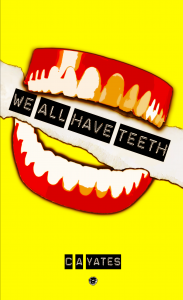

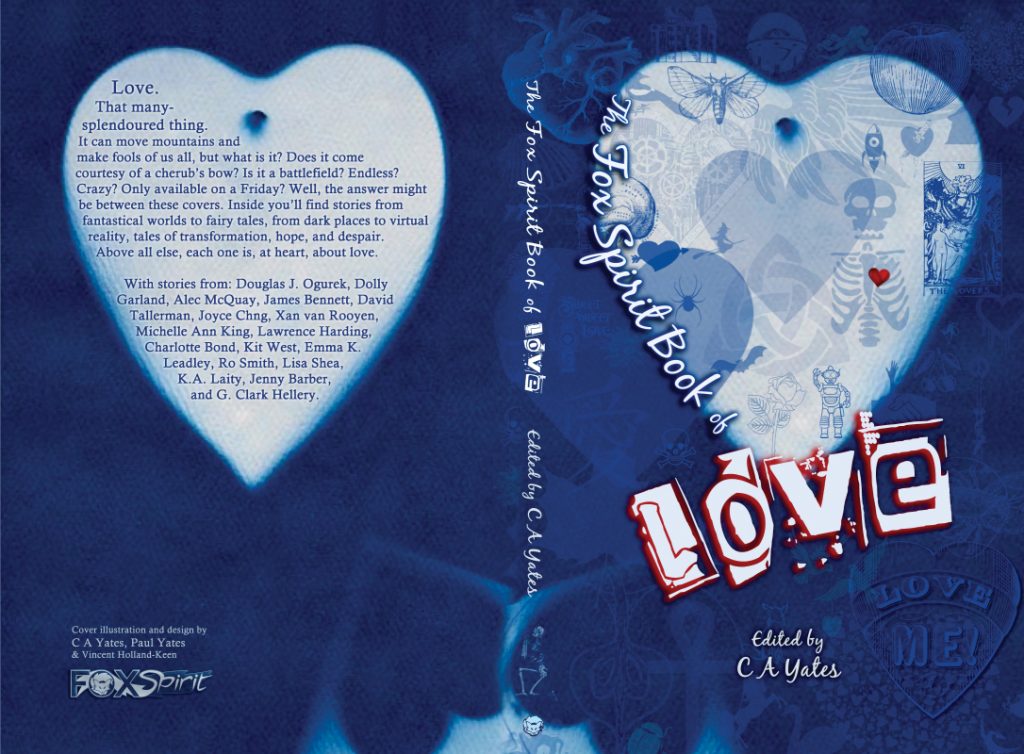
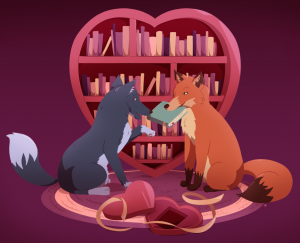
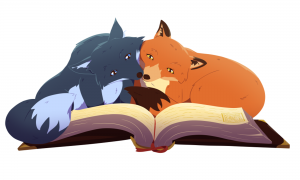
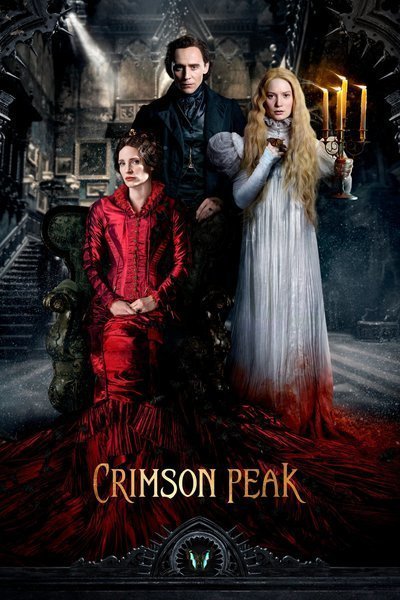
 Most gothic romances are not the love stories the Cyril Sneers of this world so enjoy denigrating. Almost none of them end with a clichéd guy-saves-the-day-and-gets-the-girl denouement. Take Maud Ruthyn from Le Fanu’s Uncle Silas, a heavy influence on Crimson Peak. She is married at the end of the novel but no one comes to save her at the end of her story. She escapes her wicked uncle and his machinations by herself. Gothic romances are, in essence, about the journey to adulthood. Heroines are almost invariably very young women, of marriageable age but only just, thrown into circumstances beyond their control that test them to the extreme. After her ordeal, the gothic heroine more often than not gives up her childish dreams of adventure and accepts her prescribed role in society, usually as a wife and mother. The genre is not admiring the strength these women show so much as it is punishing them for their desires and admonishing them into accepting their proper place. These are cautionary tales. Edith Cushing, our heroine in Crimson Peak, however, rips up the rulebook and eats it for breakfast. Hers is not simply a journey of self-discovery that’s going to put her back at hearth and home; Edith sets out to make sure she is who she thinks she is or, perhaps moreover, become what she wants to become. What is that?
Most gothic romances are not the love stories the Cyril Sneers of this world so enjoy denigrating. Almost none of them end with a clichéd guy-saves-the-day-and-gets-the-girl denouement. Take Maud Ruthyn from Le Fanu’s Uncle Silas, a heavy influence on Crimson Peak. She is married at the end of the novel but no one comes to save her at the end of her story. She escapes her wicked uncle and his machinations by herself. Gothic romances are, in essence, about the journey to adulthood. Heroines are almost invariably very young women, of marriageable age but only just, thrown into circumstances beyond their control that test them to the extreme. After her ordeal, the gothic heroine more often than not gives up her childish dreams of adventure and accepts her prescribed role in society, usually as a wife and mother. The genre is not admiring the strength these women show so much as it is punishing them for their desires and admonishing them into accepting their proper place. These are cautionary tales. Edith Cushing, our heroine in Crimson Peak, however, rips up the rulebook and eats it for breakfast. Hers is not simply a journey of self-discovery that’s going to put her back at hearth and home; Edith sets out to make sure she is who she thinks she is or, perhaps moreover, become what she wants to become. What is that?